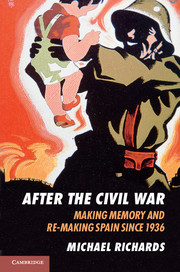Book contents
- Frontmatter
- Contents
- List of maps and tables
- Preface
- Acknowledgements
- Maps
- Introduction: cultural trauma in Spain
- Part I Setting the scene
- Part II Memories of war during the Franco years
- Part III Memories of war after Franco
- Conclusion: the history of war memories in Spain
- Glossary and abbreviations
- Sources and select bibliography
- Index
- References
Introduction: cultural trauma in Spain
Published online by Cambridge University Press: 05 June 2013
- Frontmatter
- Contents
- List of maps and tables
- Preface
- Acknowledgements
- Maps
- Introduction: cultural trauma in Spain
- Part I Setting the scene
- Part II Memories of war during the Franco years
- Part III Memories of war after Franco
- Conclusion: the history of war memories in Spain
- Glossary and abbreviations
- Sources and select bibliography
- Index
- References
Summary
This book explores how the life-shattering ordeal of Spain's civil war and repressive aftermath has been remembered and represented during the post-war decades from 1939 to 2007, the moment at which the Spanish parliament passed a government-sponsored Law of Historical Memory. The principal aim is to place into historical perspective the recent preoccupation with memory, which has been at the centre of Spanish political debate on justice and reparation since the late 1990s. The legacy of civil war rupture and post-war violence was sustained and significant during the unprecedented social change from the 1950s onwards, as ‘official’ or doctrinal memory, personal testimony, and the constructed narratives of public figures attest. ‘Master narratives’ and mythscapes of the war persisted and overlapped, forming the background to the historical picture of the war constructed both by individuals and by identifiable communities of memory. Throughout the post-war decades, remembering the conflict and its victims was shaped and understood according to the shared qualities and objectives valuable to the formation of collective identities. Most recently, memorial activity, crystallised particularly through the excavation of wartime burial pits and the identification and dignified reburial of the mortal remains of Republican victims of wartime and post-war terror, has been stamped with the impression of a universal culture of human rights.
During the long Franco era (1939–75), those who were free to remember collectively and able to participate symbolically in the public replaying of the recent conflict were counted exclusively amongst the victors. These public representations formed the basis of officially encouraged claims to a collectively traumatic past. The concept of cultural trauma will be understood here as a tapestry of historical constructs depicting specific painful events which is shaped by the post facto interplay of political power, social relationships and agency, and shared structures of meaning. Whilst related materially and metaphorically to personal trauma (persistent damage caused to individuals who have lived through violent experiences which cannot be forgotten), cultural trauma is viewed here as something distinct. This remains the case even though it is essential to recount many individually traumatic experiences in order to make sense of and evaluate claims of collective trauma.
- Type
- Chapter
- Information
- After the Civil WarMaking Memory and Re-Making Spain since 1936, pp. 1 - 10Publisher: Cambridge University PressPrint publication year: 2013

